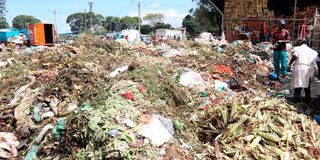Company’s systems turn food waste into gas, fertiliser

A food waste dump site in Muthurwa Market, Nairobi, in March. A company has come up with products to help homes and institutions recycle their food waste. PHOTOS| LUCY WANJIRU
What you need to know:
- Landfills are the most common dumping ground for household garbage
- When organic waste decomposes in landfills, it produces a gas called methane, a greenhouse gas with 80 times more warming power than carbon dioxide
- While flush toilets use an average of nine litres per flush, the HomeBiogas Toilet only requires 1.2 litres, meaning that you can save up to 40,000 litres of water a year
Where do you usually dispose of your fruit peels, vegetable waste, other food leftovers and household waste? Chances are that you throw it away in an open area, or it ends up in landfills that harm the environment.
Landfills are the most common dumping ground for household garbage. When organic waste decomposes in landfills, it produces a gas called methane, a greenhouse gas with 80 times more warming power than carbon dioxide.
HomeBiogas, has devised a way of not only dealing with household waste and thus cut greenhouse emissions, but also produce energy and manure for household use.
Through the system, organic waste such as food leftovers, animal or human manure and other household waste are converted into renewable clean energy and fertiliser.
“HomeBiogas2, our smallest system, can manage up to 1.5 gallons of organic waste daily and generates up to two hours of free cooking gas daily,” explains Yair Teller, Co-founder and Deputy CEO of the firm. The system, he said, replaces the need to cook with polluting fuels like coal and wood.
According to the company’s environmental, social and governance report, in 2021 alone, HomeBiogas saved over 124,891 trees. In the same period, it was responsible for over 15 million hours of cooking with clean energy, in developing countries, and kept 5,805 tonnes of food waste in circulation.
“It creates tens of gallons of fertiliser every month and saves six tonnes of CO2 emissions a year,” said Mr Teller.
According to the World Bank, the world generates 2.01 billion tonnes of municipal solid waste annually, and more than a third of it is not managed in an environmentally safe manner.
Worldwide, waste generated per person per day averages 0.74 kilogram and global waste is expected to grow to 3.40 billion tonnes by 2050. Sub-Sahara Africa is one of the fastest growing waste generating regions, where more than half of waste is currently openly dumped.
“In Kenya, the massive rural urban-urban migration means that waste generation continues to rocket, yet a robust waste management system doesn’t exist,” says Richard Kainika, Secretary-General of the Kenya Association of Waste Recyclers.
According to Mr Kainika, the waste management industry in the country has continued to evolve, while facing myriad challenges.
“One of the biggest issues is that 80 per cent of waste recycling is conducted by the informal sector. Unlike developed countries where municipalities are enablers, in Kenya, most funding comes from the private sector and it’s often not sustainable. This lack of funding, he says, affects the quality of equipment used in the industry.
Lack of land for waste management, Mr Kainika says, is another major hurdle for the industry, which has seen such enterprises encroach road reserves and riparian land.
Oshik Efrati, the CEO of HomeBiogas, says one of the most important aspects of HomeBiogas is that the systems are compact and everything is done on site.
HomeBiogas, Mr Efrati said, has sold over 20,000 systems in 107 countries.
“Our customers are varied: some are suburbanites, off-gridders and tiny houses that want to use renewable energy while recycling all of their organic waste. There are others, such as Tongogara refugee camp in Zimbabwe and Dzaleka refugee camp in Malawi,” explains Mr Efrati.
HomeBiogas’ was founded by three long-time friends; Mr Teller, Mr Efrati and Mr Erez Lanzer.
“Our goal was to impact the world on many levels and today, we are impacting important, pressing issues around the world such as climate change, waste management and renewable energy,” says Mr Efrati.
Their newest product is the HomeBiogas Commercial System for industrial kitchens, which converts one tonne of waste per day on site. At Kibbutz Yagur in northern Israel, the firm has a beta testing site for an on-site commercial HomeBiogas system that converts 200 kilos of food waste into renewable gas for heating water that is used in the kitchen’s dishwasher.
The food waste is generated by the communal kitchen and dining room. It goes into a grinder, that automatically feeds it into the 3,700-gallon digester tank. The quantity of biogas generated could produce up to 200 kWh/day of electricity, reducing greenhouse gas emissions by one tonne per day.
There are 90 employees at HomeBiogas and every day at 1pm they sit down together to eat lunch cooked using renewable energy generated by a HomeBiogas system. All food leftovers are fed back into the system, which in turn creates renewable energy for tomorrow’s lunch.
Their other product is the Bio Toilet, which uses an anaerobic system to decompose waste and transform it into biogas.
“While flush toilets use an average of nine litres per flush, the HomeBiogas Toilet only requires 1.2 litres, meaning that you can save up to 40,000 litres of water a year. In 2021, HomeBiogas conserved 70,080,000 litres of water,” their report notes.
This story was produced as part of the 2022 Climate Change Media Partnership, a journalism fellowship by Internews' Earth Journalism Network and the Stanley Center for Peace and Security





